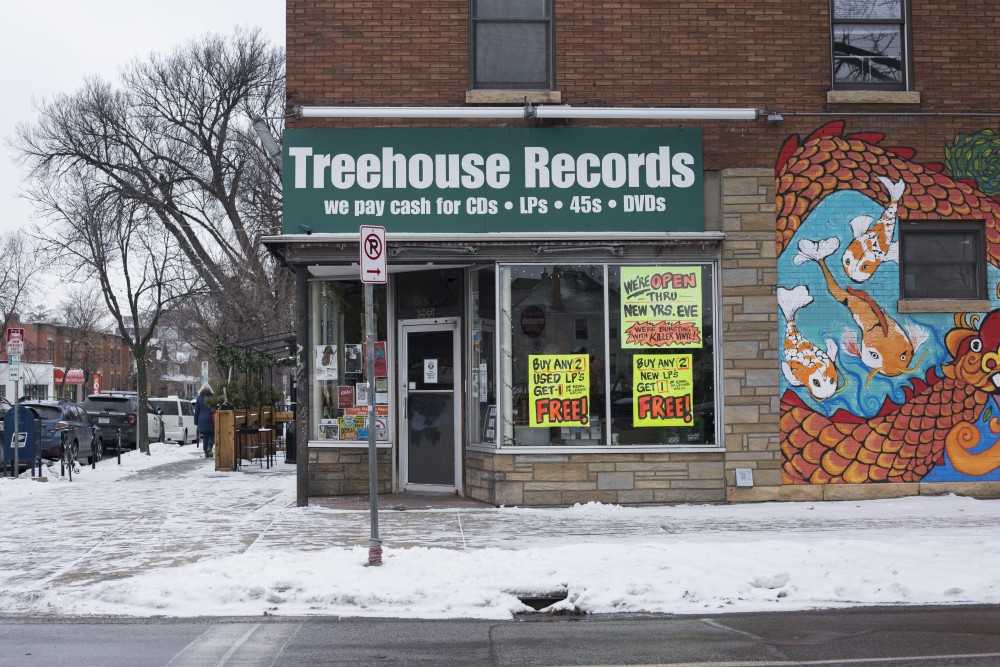The owner of Treehouse Records, Mark Trehus, has been in the Twin Cities vinyl industry for a long time. Before Treehouse Records, he managed Oar Folkjokeopus, from 1985 to 2001, until he bought the shop and renamed it.
In other words, Trehus has a 32-year history with vinyl. But in that time, he’s watched the local music scene fade to a silhouette of what it once was.
Trehus is closing his shop, Treehouse Records, on Lyndale Avenue South and West 26th Street, Dec. 31. His shop is under no financial distress, but “we are no longer the go-to place for as many people as before,” Trehus said. “I have had a great ride, and a lot of fond memories. I wanted a cool record collection, and I now have one that I wouldn’t trade with anyone in the state. My work is done.”
From Koerner, Ray & Glover to The Replacements, Trehus has bdorne witness to several generations of local music.
Oar Folk was the go-to place for music fans in the ’70s and ’80s. Treehouse continued to uphold the banner, but it’s grown weathered over time.
“People have changed,” Trehus said. “The music industry has changed.”

“In many ways, it’s like losing a friend,” said comedian Ray McCloney, who began his career lip-syncing at First Avenue and buying his records at Oar Folk.
“I’ve always been conscious of the fact that the neighborhood that store serves is mostly migratory, transitional — in that zip code, 80 percent of the residences are rentals… that’s changing. The city planners and the city council want to turn Lyndale Avenue into a major commercial corridor… given the rising rents and the changing demographics in the neighborhood, it doesn’t make as much sense to have the store in that location as it would to have one somewhere else, off the beaten track.”
A six-story building is going up across the street from the shop, so jackhammers interrupt the spinning LPs constantly.
And that’s just part of the story.

“Used records are being sold everywhere… from dedicated vinyl shops to those businesses offering small selections inside coffee shops and hair salons,” Trehus said. “Dead Media is doing a fantastic job of appealing to millennials by offering book readings, live music and other culturally relevant events. I think that my business model… is no longer relevant or sustainable, especially in my gentrifying neighborhood.”
He’s says that he’s been lucky the shop has done so well.
“Most of my contemporaries have gone out of business or they’re struggling. Business is fine. I’m moving on for personal reasons. It has nothing to do with economics.”
Trehus looked back on the Minneapolis music scene as he’s witnessed it, starting with Oar Folk record shop, which he called the “Mecca for musicians in the nascent punk rock scene.”
“Back in the day, an independent record shop was kind of synonymous with a head shop. Most stores sold smoking accessories and incense [alongside] records. So in the ’70s, it was kind of a hippie vibe. They had names like ‘The Optic Nerve’ and ‘Licorice Pizza’ and ‘The Electric Fetus.’”
Finally, the punk scene made its way to town.
“When Oar Folk opened up, I was calling around town to find Patti Smith’s 45 [vinyl talk for ‘single’] that had a cover of ‘My Generation’ by The Who. I called all around town ‘cause I’d read about it in Rolling Stone and then I called Oar Folk. A guy named Andy Schwartz answered the phone — he went on to become the editor of New York Rocker and Vice President of Epic Records in New York — but he lived here, worked at Oar Folk. And he answers the phone. I go, ‘Do you have the Patti Smith 45 of ‘My Generation’?’ He says, ‘Of course we do!’ and slams down the phone. It was a different kind of record store.”
The shop was the hub for obscure music in the ’70s.
“Back in those days, it was the only place you could go to buy things like a Sex Pistols single and a Ramones single, when all that stuff first started coming out. The other places were in the latter days of hippiedom. [Oar Folk] served a community of people who liked adventurous music, like Devo or The Clash.”
In those days, it was more than a shop.
“Oar Folk [was] less of a retail store and more of a clubhouse — we were always happy to have people come in who weren’t necessarily spending money on records, who were interested in who’s playing in town, what new records were coming out,” said Peter Jesperson, who managed the store from ’73 to ’83.
“At other places, folks know music,” McCloney said. “But they don’t have that sense of community.”
That was how the local music scene operated before the Internet.
“Until 1985, Oar Folk was still sort of the local scene [for punk rock]. It was centered on adventurous sound. Then in ’85, there was a fire. And that fire symbolized the end of an era for a whole lot of people. Oar Folk reopened about a year and a half later… but the scene had splintered,” Trehus said.
Upon its reopening, Trehus became the manager of the store.
“Of course I’m sad,” Jesperson said. “There’s great sentimental attachment to that store. But I understand that Mark desires to move on and it’s not like there aren’t other great record stores in Minneapolis and St. Paul [like Barely Brothers and Dead Media].”
After he closes the shop (its last day is Dec. 31), Trehus plans to learn more languages, travel internationally with his wife Alice and pursue philanthropic endeavors. He’s soul-searching. As he put it, “When I leave, how can I do something I’ll be proud of?”










